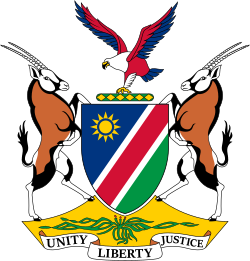 |
|---|
Established in 1990, the Ministry of Justice of Namibia provides court representation to ministries, offices, agencies, the master of the High Court, the speaker of the National Assembly, the prosecutor-general, magistrates, the Motor Vehicle Accident Fund, regional councils, recognized traditional authorities, and entities associated with the government administration. [1] It also supports the Law Reform and Development Commission. [2]
Contents
In 1995, the Ministry of Justice merged with the Attorney General's Office. [3] [4]